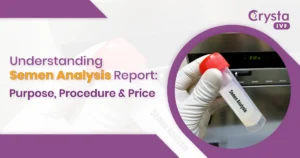Confused whether to consult a urologist, andrologist, or any male infertility doctor when you are facing infertility problems is a real challenge.
With so many specialisations in reproductive health, it’s easy to feel overwhelmed about where to start. But consulting the right doctor specialising in the treatment of fertility issues can provide you with the most accurate information about your specific case.
So, here is some information to help you decide which type of doctor to see for male infertility.
Why Do You Need a Male Fertility Test?
A male fertility test is essential to understand whether your sperm health is affecting your ability to conceive.
According to the World Health Organisation (WHO), ‘infertility’ is a disorder of the reproductive system that impairs organs and hormones responsible for the primary function of reproduction. Infertility in men accounts for about 40-50% of all infertile couples.
If you and your partner struggle to conceive, it’s essential to consult with a fertility specialist to determine the cause of your infertility.

This will help them to identify any potential underlying causes of your infertility.
However, when it comes to seeking treatment for male infertility, there are different doctors that you can consult depending on the cause of your condition.
Which Type of Male Fertility Doctors Can You Consult?
When it comes to seeking treatment for male infertility, there are different doctors that you can consult depending on the cause of your condition.
Urologist
For male infertility, it’s best to start with a urologist. Urologists are medical doctors who specialize in disorders of the urinary tract and male reproductive organs. They will likely perform a physical examination as well as order tests to investigate the cause of your infertility.
Urologists can provide comprehensive evaluations and create personalized treatment plans based on the underlying causes of your infertility.
Reproductive Endocrinologists (Fertility Specialists)
If your case is due to a blockage in the ducts that transport sperm from the testicles, you may need to see a reproductive endocrinologist.
A Reproductive Endocrinologist (RE) is focused on helping patients with both male and female fertility issues. After additional training in infertility, this gynaecologist can provide treatments that can improve the chances of conception. In some cases, REs may also be referred to as simply fertility specialists.
Reproductive Endocrinologists can also help with fertility preservation for cancer patients, working with an oncologist to manage Cryopreservation before the start of fertility-threatening cancer treatments.
Dr. Nidhi Sehrawet is a renowned fertility specialist in Delhi with more than 10+ years of experience. She has provided fertility treatments to numerous patients, from IUI and IVF to ICSI.
Andrologists
Andrologists are also urologists but have completed additional training in male fertility. This allows them to evaluate and treat male fertility issues effectively, along with a reproductive endocrinologist.
Andrologists may look further to find the cause for low or absent sperm counts and, with treatment, potentially improve the situation. Additionally, they can perform a testicular biopsy for use in testicular sperm extraction (TESE).
Reproductive Immunologists
Reproductive immunologists have extensive knowledge of immunology & reproductive medicines. The specialist can be consulted in cases of unexplained infertility, repetitive miscarriage, and in vitro fertilisation (IVF) failures.
Reproductive immunologists may also help in cases where one is diagnosed with a chronic condition like endometriosis or an autoimmune disease.
OB/GYN (Obstetrician and Gynecologist)
A certified gynaecologist or OB/GYN (Obstetrician and Gynaecologist) has specialised training in reproductive health, making them uniquely qualified to address fertility issues.
Though OB/GYN specialists specialise in female reproductive health, in some cases, they might be the first fertility specialist you’ll meet for any male fertility issues.
Doctor at Crysta IVF centre in Patna is a highly experienced obstetrician and gynaecologist. She has treated countless patients with different fertility treatment options for both males and females.
Which Specialist Should You See for Male Infertility?
| Doctor Type | Role in Male Infertility | When to Consult |
| Urologist | Specialises in the male reproductive system and urinary tract. Can treat structural or hormonal issues. | If you have low sperm count, varicocele, erectile dysfunction, or ejaculation problems. |
| Andrologist | A subspecialist of urology focused solely on male fertility and sexual health. | For sperm-related issues, hormone imbalance, or advanced fertility evaluation. |
| Reproductive Endocrinologist (REI) | Fertility specialist trained in hormonal issues and ART (like IVF, ICSI). Usually treats couples. | When fertility treatment like IVF is being considered or if the female partner also needs evaluation. |
| Reproductive Immunologist | Focuses on immune system issues affecting reproduction in both males and females. | Focuses on immune system issues affecting reproduction in both males and females. If recurrent IVF failure, unexplained infertility, or suspected immune problems. |
| OB/GYN (Obstetrician & Gynaecologist) | Primarily focused on female reproductive health, but may guide initial fertility evaluations. | If starting fertility evaluation as a couple, may refer the male partner to specialists. |
Who is the Best Male Infertility Doctor Near You?
What Are the Causes of Male Infertility?
Male infertility can have many causes, including hormonal imbalances, genetic factors, health conditions, and lifestyle choices. Common causes include:
- Low sperm count or poor motility (how well sperm move)
- Abnormal sperm shape (morphology)
- Varicocele (enlarged veins in the scrotum that affect sperm production)
- Hormonal imbalances, especially low testosterone
- Ejaculation problems like retrograde ejaculation
- Genetic conditions such as Klinefelter syndrome
- Infections that affect reproductive organs (e.g., mumps, STDs)
- Exposure to heat, radiation, or toxic chemicals
- Lifestyle habits like smoking, excessive alcohol, drug use, obesity, and stress
What to Expect During a Male Fertility Evaluation?
When you visit a fertility specialist, a detailed evaluation is done to understand the root cause of infertility. This usually includes:
- Semen Analysis – To check sperm count, motility, and shape
- Hormone Test – To assess testosterone and other reproductive hormone levels
- Urine Analysis – To rule out infections or signs of retrograde ejaculation
- Genetic Testing – To detect hereditary issues affecting fertility
Transrectal Ultrasound – To examine the prostate and check for blockages or abnormalities in the reproductive tract
How to Choose the Right Doctor for Male Fertility Treatments
Choosing the right doctor for male fertility treatment can make a huge difference in your journey to parenthood. Since male infertility can be caused by various medical, hormonal, or lifestyle-related issues, selecting the right specialist depends on your symptoms and medical history.
Here are some helpful tips:
- Identify Your Needs: Start with a semen analysis and consult based on your condition (urologist, andrologist, or fertility specialist).
- Check Specialisation: Look for doctors experienced in male infertility issues like low sperm count or azoospermia.
- Evaluate Experience with ART: Ensure the doctor handles ICSI, sperm retrieval, or other advanced fertility techniques.
- Verify Credentials: Choose a certified specialist with training in male reproductive health.
- Look for Personalised Care: Prefer doctors who listen, counsel patiently, and respect your concerns.
Consider Technology & Support: Opt for clinics offering advanced labs, treatment transparency, and digital convenience.
Summing It Up
Many factors can contribute to male infertility, which can be challenging to identify and treat. If you suspect that you may be dealing with infertility, it is essential to consult with a medical professional who specialises in this area.
In order to ensure the best possible outcome, it is crucial to find an experienced doctor who can provide comprehensive care and treatment. The team at Crysta IVF fertility clinic in India has extensive experience helping men overcome infertility and achieve their dreams of fatherhood.
Get a consultation now, and we will help you find the right doctor for your medical needs.
Frequently Asked Questions
What kind of doctor treats male infertility?
A urologist or andrologist usually treats male infertility. In cases involving assisted reproduction, a fertility specialist (reproductive endocrinologist) may also be involved.
Do I need to see a urologist or an andrologist for male fertility issues?
If you’re dealing with sperm-related issues or sexual dysfunction, an andrologist is ideal. For broader reproductive or urinary concerns, a urologist is also appropriate.
Can a fertility doctor help with male infertility?
Yes. Reproductive endocrinologists or fertility doctors treat both male and female infertility and often coordinate with urologists or andrologists for male-specific treatments.
When should I see a male infertility doctor?
If you’ve been trying to conceive for over a year without success, or six months if the female partner is over 35, you should consult a male infertility doctor.
What tests will a male infertility doctor recommend?
Common tests include semen analysis, hormone testing, genetic screening, scrotal ultrasound, and urinalysis, depending on the case.
How much does it cost to consult a male infertility specialist?
The consultation fee can range from ₹500 to ₹2000, depending on the doctor and clinic. Additional tests may have separate charges.
Can male infertility be treated successfully?
Yes, many cases can be treated with medication, surgery, lifestyle changes, or assisted reproductive techniques like IVF or ICSI.
How do I find the best male fertility doctor near me?
Search for board-certified and experienced specialists, read patient reviews, check clinic success rates, and consider comfort level during the consultation.
What is a male fertility doctor called?
A male fertility doctor is commonly called an Andrologist or a Urologist who specialises in male reproductive health. In some cases, a Reproductive Endocrinologist (fertility specialist) may also be involved in managing male infertility, especially during assisted reproductive treatments like IVF or ICSI.
Can a Gynaecologist treat male infertility?
No, a gynaecologist primarily treats female reproductive issues. While they may initiate a basic couple’s fertility assessment, they usually refer the male partner to a urologist or andrologist for further evaluation and treatment.




